News in Brief
St. Joseph Health Invests $2 Million in North Coast Nursing Program
Grant kick-starts permanent endowment
OFFICIALS FROM HUMBOLDT STATE UNIVERSITY and College of the Redwoods recently joined state Sen. Mike McGuire to celebrate and thank St. Joseph Health, Humboldt County (SJH-HC) for making a $2 million grant to help launch the RN to BSN nursing program at HSU.
Health care leaders and elected officials from across the county were on hand as the grant was announced in March at Humboldt State University. Many of them, including McGuire, have been part of the coalition that has been instrumental in establishing the North Coast Bachelor of Science in Nursing program.
“As a nonprofit health care organization, St. Joseph Health, Humboldt County is blessed to be in a position to sustain the rich legacy of caring for our community that our founding Sisters chartered nearly a century ago,” said Roberta Luskin-Hawk, M.D., chief executive, SJH-HC. “It is with this deep understanding of our commitment to serve our dear neighbors that we enter into this momentous partnership with HSU.”
The $2 million grant is a major investment in enhancing health care and addressing the nursing shortage on the North Coast. SJH-HC is providing the grant through its Community Benefit program, which designates a portion of the organization’s annual operating expenses for investing in the health and wellness of the community.
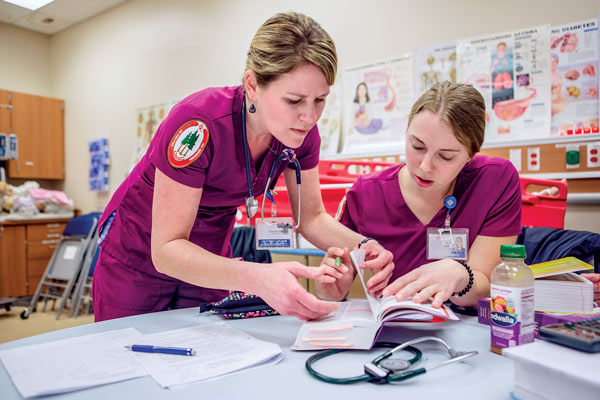
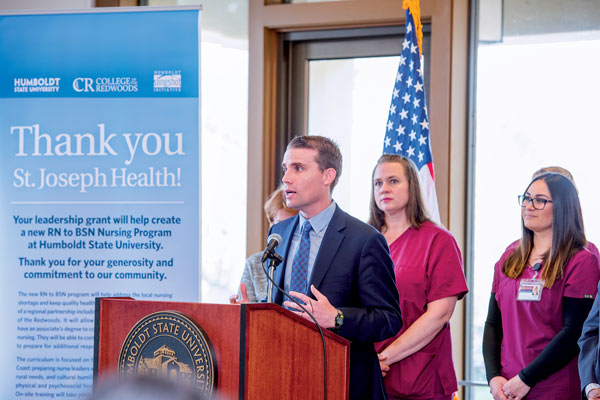
Starting in Fall 2020, students in the College of the Redwoods’ RN program (below) can pursue their bachelor’s degree in Nursing at HSU. The BSN program is made possible by a $2 million grant from St. Joseph Health, Humboldt County. The grant was announced by state Sen. Mike McGuire (left) and others at a ceremony earlier this year at HSU.
“There is a severe nursing shortage on the North Coast and it’s impacting the health and well-being of patients and increasing the cost of delivering health care,” said McGuire, who has spearheaded the launch of the BSN program on the North Coast with Humboldt State and the College of the Redwoods. “We are truly grateful for St. Joseph Health stepping up and making a major investment to the nursing endowment and for the groundbreaking partnership of HSU and the College of the Redwoods who are leading the way to educate the next generation of nurses on the North Coast.”
The RN to BSN program will allow registered nurses who already have an associate’s degree to complete their bachelor’s degree in nursing. The additional education will enable nurses to meet new hiring educational requirements some hospitals have implemented which require a BSN degree and allow them to prepare for leadership or advanced clinical training such as nurse practitioner roles. The program will also ensure the North Coast is educating its own nurses, which will make the entire health care system more resilient and create hundreds of family-sustaining careers in the years to come. Nurses will be able to continue working while completing the program.
Based on discussions with health care providers throughout the area, the curriculum is focused on particular needs of the North Coast: preparing nurse leaders who understand health disparities, rural needs, and cultural humility, and who can advocate for the physical and psychosocial health of the region’s communities. On-site training will take place at St. Joseph Hospital and other health care facilities throughout the region.
HSU President Tom Jackson, Jr., stressed the long-term benefits of the program. “This program is more than about attaining a degree,” he said. “Nurses will be learning, working, and living alongside the very community they’ll assist. We’re so thankful to all our partners and supporters for helping us grow our healthcare workforce and improve the health and wellbeing of our region.”
Efforts to develop the RN to BSN program have been under way for nearly three years, following a pivotal gathering of health care leaders, and CR and HSU officials. At that meeting, there was broad agreement on the need for such a program and commitments to support it.
In the last few months, University officials and others have launched a campaign for the first phase of an endowment to support the program. The University has also hired Kimberly Perris as the new director to lead the program. The leadership shown by St. Joseph gives the effort significant momentum to meet the goal of enrolling the first students by Fall 2020.
2018 Sees Highest Graduation Rate in History

HSU’S CLASS OF 2018 broke records, with graduation rates for first-time and transfer students hitting all-time highs. The progress was thanks in part to several initiatives designed to support student success.
HSU’s four-year graduation rate for first-time freshmen has increased from 14.5 percent in 2015 to 21.9 percent in 2018 (a 51 percent increase). The six-year graduation rate for first-time freshmen has increased from 46.5 percent in 2015 to 52.4 percent in 2018 (a 13 percent increase). The two-year graduation rate for transfer students has increased from 26.5 percent in 2015 to 37.2 percent in 2018 (a 40 percent increase).
HSU’s success reflects efforts under the California State University system’s Graduation Initiative 2025. The goals of this system-wide initiative are to increase graduation rates while reducing opportunity gaps for first-generation and traditionally underrepresented students, and for Pell grant recipients.
“We invested strategically in academic and social resources—two factors that can affect students’ success at Humboldt State,” says former Interim Vice Provost Rock Braithwaite.
To address retention and graduation, the University have undertaken several efforts, which has included hiring more tenure-line faculty. Over the last four years, more than 50 tenure-track faculty have been hired, and the student-faculty ratio had dropped from 22:1 to 20:1 by Fall ‘18.
In addition, students were offered more sections of courses that are repeated often, have low rates of success, or are in high demand. GI 2025 funds helped lower costs for summer bottleneck courses students needed to graduate.
The University also focused on: conducting a course audit and alert campaign for students on the cusp of graduation; reducing the number of students on academic probation through academic advising and peer mentoring; contacting students who are nearing graduation and encouraging them to enroll and finish; improving student orientation and increasing student and family engagement.
“We’ve made progress, and there’s more to be done. We’re actively working to improve students’ experience at all stages of their college career so they can stay on track for graduation,” Braithwaite said.
Professor Honored on National LGBTQ Wall of Honor
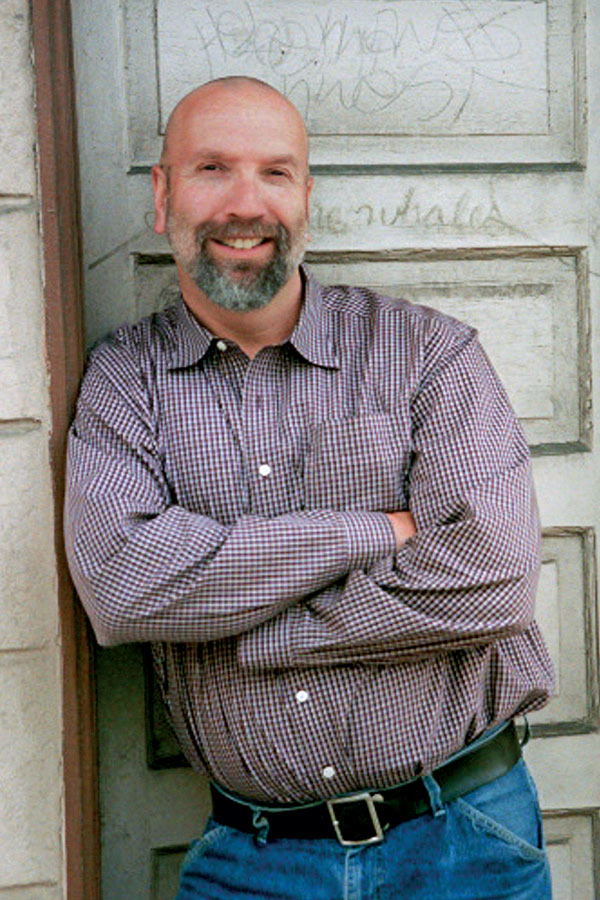
HSU’s Eric Rofes Multicultural Queer Resource Center.
THE LATE ERIC ROFES, a scholar, activist, and professor of Education, was honored this year for his work in queer liberation and social justice on the National LGBTQ Wall of Honor at the Stonewall Inn in New York City.
Rofes, who died in 2006, was instrumental in developing the Multicultural Queer Studies minor at HSU (which later became part of the Department of Critical Race, Gender & Sexuality Studies) and is the namesake of the Eric Rofes Multicultural Queer Resource Center, which supports LGBTQ students and continues his community organizing efforts around queer, anti-racist, and feminist activism. He founded and led gay organizations in major U.S. cities, authored groundbreaking books on gay men’s health, and organized national meetings on gay and lesbian issues.
“Eric was a whirlwind of energy and brilliance at HSU and in the world, and I miss him daily,” says CRGS Professor Christina Accomando. “His influence continues to be felt through our curriculum, our student organizations, and Eric’s former students who continue to do amazing things to make this a better world.”
Activist and Professor Eric Rofes is the namesake of HSU’s Eric Rofes Multicultural Queer Resource Center.
Immigration Legal Help Comes to Campus
THE CALIFORNIA STATE UNIVERSITY SYSTEM announced recently a plan for the provision of immigration legal services for CSU students and employees.
The California Department of Social Services has contracted with four providers throughout the state to deliver legal services to all CSU campuses, including HSU. The rollout of services is expected to be phased in over the next six months.
Attorneys, paralegals and/or accredited representatives from the service providers will visit campuses on a routine basis. Initially, the types of legal services offered will be limited to general consultations, DACA renewals, and general assistance in filling out forms.
Dan Saveliff, Humboldt State’s liaison for the CSU service and director of the Educational Opportunity Program (EOP), says providing access to this service—available to HSU students, faculty and staff—will help meet a major need for the campus community.
“We don’t have immigration legal services in our region, as far south as Santa Rosa and east to Redding,” says Saveliff. “We have advocacy and support programs on campus and in the local community, but immigration law requires expertise that’s not accessible. So we’re excited the campus will have access to that expertise.”
“We have advocacy and support programs on campus and in the local community, but immigration law requires expertise that’s not accessible. So we’re excited the campus will have access to that expertise.” —Dan Saveliff
Starting in September, an immigration lawyer from the Coalition for Humane Immigrant Rights will be on campus for a few days each month to provide legal assistance at the EOP office. While undocumented students receive priority for legal services appointments, students who are from mixed-status families (regardless of the student’s own citizenship or residency status) may also have immigration questions and are invited to make an appointment as well. Employees are also eligible for appointments.
For full details, go to hsu.link/immigration-legal-services
Trinity Annex Will Become Hub of Children’s Services

Childrens Center West Elevation
C Street View
HSU HAS RECEIVED $8.6 MILLION to rebuild the Trinity Annex to house the University’s Children’s Center. The Child Development Laboratory is also exploring opportunities to relocate to the remodeled space.
This project will allow more children to receive services, improve efficiency of operations and sustainability, open the programs’ current location to development, and reduce the amount of maintenance needed for campus infrastructure.
The renovation of the Trinity Annex, at 14th and B streets on the south end of campus, is possible thanks to $8.6 million in one-time funding from the State of California Budget allocated by the CSU Office of the Chancellor. The project is expected to be completed in fall 2021.
The existing Trinity Annex building will undergo extensive work, but will retain the aesthetic of the west, original building. The building will be rebuilt to its current footprint design and complementary to the existing architecture. Built in 1944, the building served as the Trinity Hospital until 1972. The HSU Foundation purchased the property and in 2018 transferred ownership to the University.
Under the University’s plan, the renovated facility will include play yards and better pedestrian and traffic circulation.
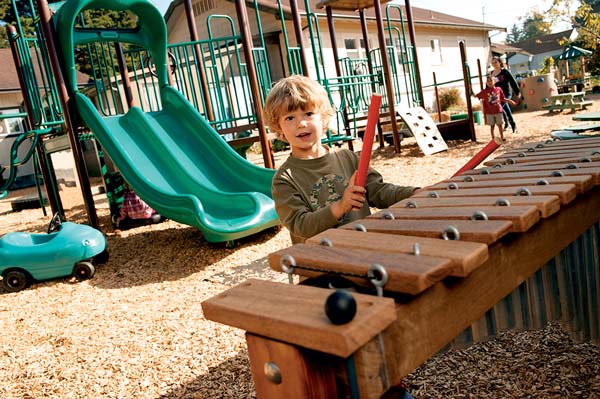
“We are very excited for this move,” says Children’s Center Director Betsy Wilson. “This new facility will allow us to increase our ability to continue our mission of providing high quality childcare to families in the University community, as well as training opportunities for the many student assistants we employ.”
A report commissioned by HSU found that early childhood education and the mission and values of the University are profoundly interrelated, and that child care is central to campus life for many students, staff, and faculty.
“Faculty and staff at the Child Development department and Child Development Lab are excited about this proposal,” says Hyun-Kyung You, Child Development Lab program leader. “Overall, this potentially helps us continue our vision and mission, and do even better at what we have been proudly doing.”
Established in 1971, the HSU Children’s Center has continually provided affordable, subsidized, high-quality child care and early education programs for children aged three months to five years for HSU students, staff, and faculty families. Along with providing a broad range of comprehensive services to families, the Children’s Center also employs student assistants as supervised “teachers in training” each semester.
For 50 years, the Child Development Lab, as a part of the Department of Child Development, has been a special environment designed to provide a model preschool for children, create a learning center for University students and faculty, support and educate parents of young children, and serve as a research and instructional center.
Big Drop in Humboldt Student Debt

IT’S A SURPRISING TREND and a bit of a well-kept secret. Even as the nation’s average student loan debt has steadily climbed, it has actually been going down for students at Humboldt State University.
An analysis by HSU’s Office of Financial Aid found the average debt for an HSU student who graduated with a bachelor’s degree has dropped from $20,982 in 2008-09 to $12,743 in 2017-18.
Meanwhile, the opposite trend has been underway across the nation and in California.
In 2016-17, the national average debt of students who earned bachelor’s degrees was $28,350, the state average was $22,744 and within the California State University system—where tuition remained steady from 2011-12 to 2016-17—the average debt was $16,625, according to the CSU.
“We all know the country is in the middle of a student debt crisis, so it’s encouraging to see our average loan debt steadily falling,” says HSU Financial Aid Director Peggy Metzger. “Some of this has to do with showing students how to manage their money.”
For more information, go to finaid.humboldt.edu/costs/money
Understanding the Law and Student Rights
STUDENTS AT HUMBOLDT are known to be passionate, conscientious thinkers with a desire to change the world. That’s exactly what they’re doing through the Student Legal Lounge (SLL).
Funded by Associated Students, the student-run SLL helps the HSU and local community understand legal issues and their rights, and it connects them with legal resources.
Jessica Jane Richard (’19, Philosophy), who directed the SLL with Kimberly Nguyen, says the service is a great way to keep Humboldt State’s community informed of their constitutional rights. The most common legal issue students need help with is tenant rights.
“Students may have a hard time finding and understanding when it’s appropriate to assert their constitutional rights, and since we live in such a remote area, it can be difficult to access to legal information,” she says. “However, our purpose is not to provide legal counseling and advice, it’s to provide assistance to students in researching their options regarding legal matters.”
The SLL’s primary source of outreach is its mobile cart, which can be found on campus during athletic events and on the Quad. SLL provides volunteers with the opportunity to gain a better understanding of the legal system and suggestions on how to interact with law enforcement officials.
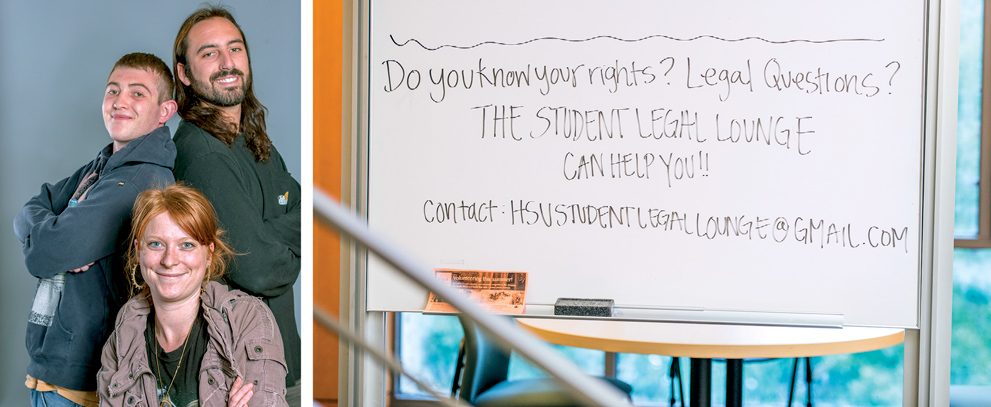
Left to right: Cole Haselip (‘19, Political Science), Jessica Jane Richard (‘19, Philosophy), and Joseph Kleist (‘18, Environmental Studies) made up part of the Student Legal Lounge (SLL) team last year. SLL is a legal resource for the campus and the local community